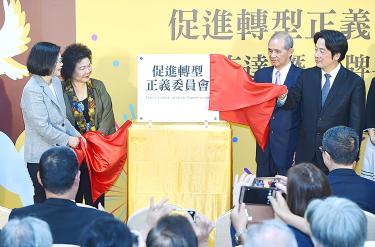The Transitional Justice Commission tasked with uncovering the history of political repression during the Martial Law era was formally launched yesterday at a ceremony attended by President Tsai Ing-wen (蔡英文) and Premier William Lai (賴清德).
It was time to close the era of authoritarianism and that the establishment of the commission was a testament to the nation’s consolidated democracy, Tsai said in a speech at the ceremony.
Over the past 30 years of democratization, Taiwan has had little awareness of the importance of transitional justice, she said.
As a result, work on promoting transitional justice has been focused mainly on distributing compensation or issuing certificates of restored reputation to victims of political repression, she said.
Governments of the past did not embark on a systematic truth-seeking investigation to establish responsibility and failed to set up a legal mechanism for the rehabilitation of victims, she added.
As the government did not do enough in those areas, the wounds that were inflicted on the nation’s history have not healed, which makes it difficult to enter the phase of dialogue and reconciliation, Tsai said.
However, “we are going to get out of that plight, starting today,” she said.
Citing the examples of Germany, South Africa and South Korea, Tsai said special organizations to promote transitional justice have been established in many other nations.
The first mission of the commission would be to issue an accurate report on the era of authoritarian rule under the then-Chinese Nationalist Party (KMT) regime, Tsai said.
Also speaking at the ceremony, Transitional Justice Commission Chairman Huang Huang-hsiung (黃煌雄), a former legislator and Control Yuan member, told the ceremony that the main task of the commission would be to seek and disclose the facts of the authoritarian era, rather than to settle old scores and incite enmity.
Over the next two years, the commission would submit accurate reports on the era of authoritarian rule to ensure accountability and to make sure justice is served so that integration of various ethnic groups can be achieved, he said.
In accordance with the Act on Promoting Transitional Justice (促進轉型正義條例) passed in December last year, the commission consists of nine members, including three from the same political party, and no fewer than three men or women.
The main tasks of the commission are to make political archives more readily available, remove remnants of the nation’s authoritarian past, redress judicial injustice, produce a report on the history of the authoritarian era and take steps to promote transitional justice.
Source: Taipei Times - 2018/06/01





















